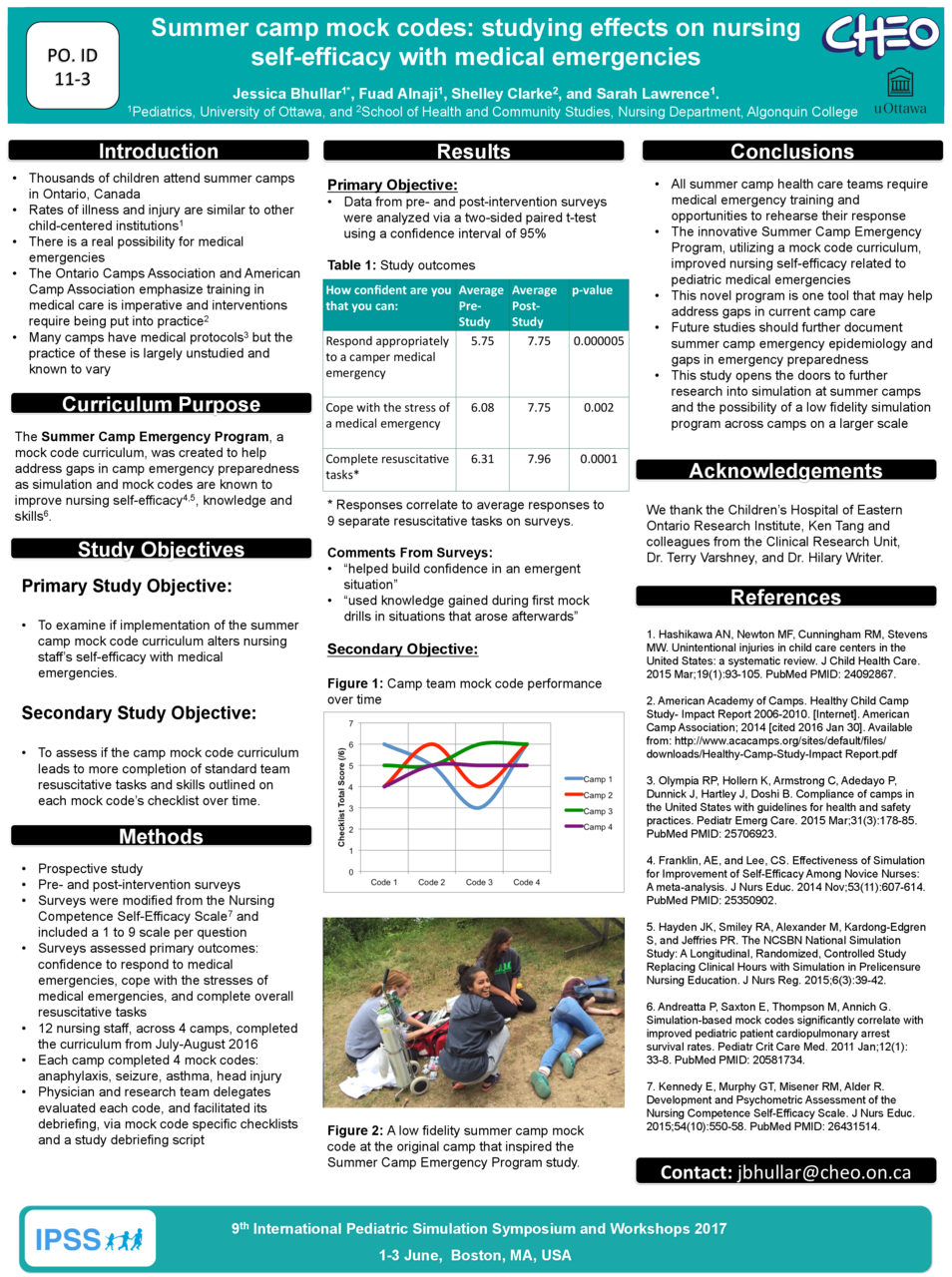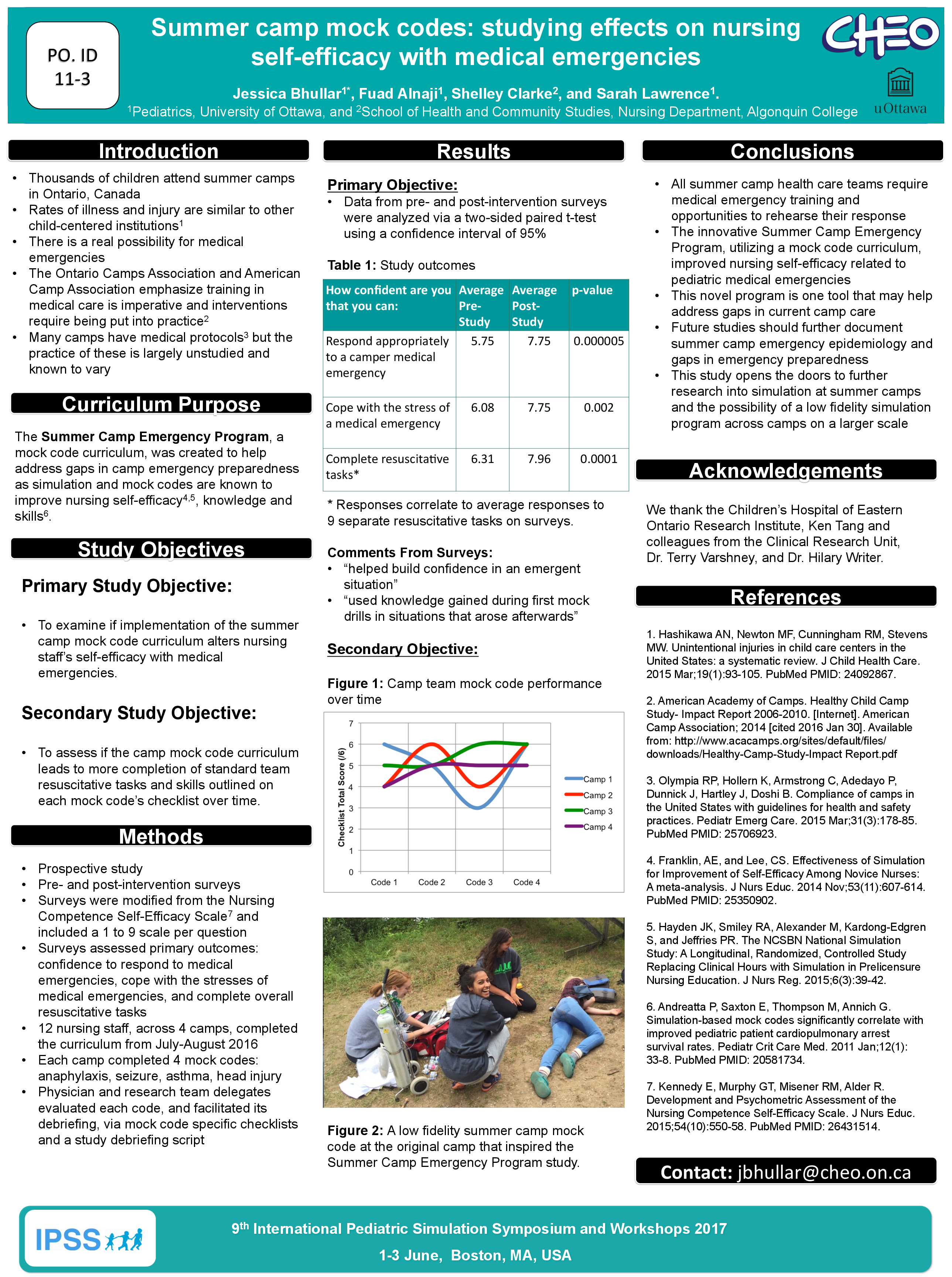Abstract
Background: With thousands of children attending summer camps, and rates of illness and injury similar to other child-centered institutions1, there is a real possibility for medical emergencies. The duty to prepare involves medical protocol creation but also practice of such emergencies2. Mock codes are simulated emergency medical scenarios that allow a team to rehearse in a safe environment, with opportunity to debrief and learn from gaps in their response.
Although many camps have written health protocols3, the practice of these is largely unstudied and known to vary. A camp mock code curriculum may help address current gaps in camp emergency preparedness, as simulation is known to improve nursing self-efficacy4,5, knowledge and skills6. It is upon this foundation that the Summer Camp Emergency Program was created, and implemented at several Ontario camps this past summer. This innovative study opens the door to pediatric simulation in summer camps and other child-centered institutions.
Research Question: Does the implementation of a summer camp mock code curriculum alter nursing staff’s self-efficacy with medical emergencies?
Methodology: A prospective study was designed using pre and post-intervention surveys to study nursing staff self-efficacy. Nursing surveys were modified from the Nursing Competence Self-Efficacy Scale7 and included a 1 to 9 scale per question. Surveys assessed the nurses’ confidence to respond to emergencies and cope with stresses of an emergency.
Twelve nurses, representing RPN’s to RN’s practicing for greater than 10 years, across four overnight campsites completed our study. Each camp completed four mock codes over the summer: anaphylaxis, seizure, asthma, and head injury. Pediatricians or pediatric residents facilitated each code and debriefing via mock code specific checklists and a study debriefing script.
Results: Data extracted from pre- and post-intervention surveys were analyzed via a two-sided paired t-test using a confidence interval of 95%. Statistically significant improvement was found in all three outcome measures: confidence to respond to emergencies improved from mean responses of 5.75 to 7.75 (p value 5.6 x 10-6), cope with stresses of an emergency from 6.08 to 7.75 (p value 2.7 x 10-3), and complete resuscitative tasks from 6.31 to 7.96 (p value 1.2 x 10-4).
Conclusion: The summer camp mock code curriculum improved nursing self-efficacy related to pediatric medical emergencies. This first of its kind program is a novel educational tool to promote confidence in providing pediatric emergency care among camp nurses and sets the foundation for further research in simulation in summer camps. Future studies should further document gaps in summer camp emergency preparedness, assess camp healthcare team performance via mock codes, and assess the feasibility of expansion of low fidelity simulation across camps on a larger scale.
References:
1. Hashikawa AN, Newton MF, Cunningham RM, Stevens MW. Unintentional injuries in child care centers in the United States: a systematic review. J Child Health Care. 2015 Mar;19(1):93-105. PubMed PMID: 24092867.
2. American Academy of Camps. Healthy Child Camp Study- Impact Report 2006-2010. [Internet]. American Camp Association; 2014 [cited 2016 Jan 30]. Available from: http://www.acacamps.org/sites/default/files/downloads/Healthy-Camp-Study-Impact Report.pdf
3. Olympia RP, Hollern K, Armstrong C, Adedayo P, Dunnick J, Hartley J, Doshi B. Compliance of camps in the United States with guidelines for health and safety practices. Pediatr Emerg Care. 2015 Mar;31(3):178-85. PubMed PMID: 25706923.
4. Franklin, AE, and Lee, CS. Effectiveness of Simulation for Improvement of Self-Efficacy Among Novice Nurses: A meta-analysis. J Nurs Educ. 2014 Nov;53(11):607-614. PubMed PMID: 25350902.
5. Hayden JK, Smiley RA, Alexander M, Kardong-Edgren S, and Jeffries PR. The NCSBN National Simulation Study: A Longitudinal, Randomized, Controlled Study Replacing Clinical Hours with Simulation in Prelicensure Nursing Education. J Nurs Reg. 2015;6(3):39-42.
6. Andreatta P, Saxton E, Thompson M, Annich G. Simulation-based mock codes significantly correlate with improved pediatric patient cardiopulmonary arrest survival rates. Pediatr Crit Care Med. 2011 Jan;12(1):33-8. PubMed PMID: 20581734.
7. Kennedy E, Murphy GT, Misener RM, Alder R. Development and Psychometric Assessment of the Nursing Competence Self-Efficacy Scale. J Nurs Educ. 2015;54(10):550-58. PubMed PMID: 26431514.






